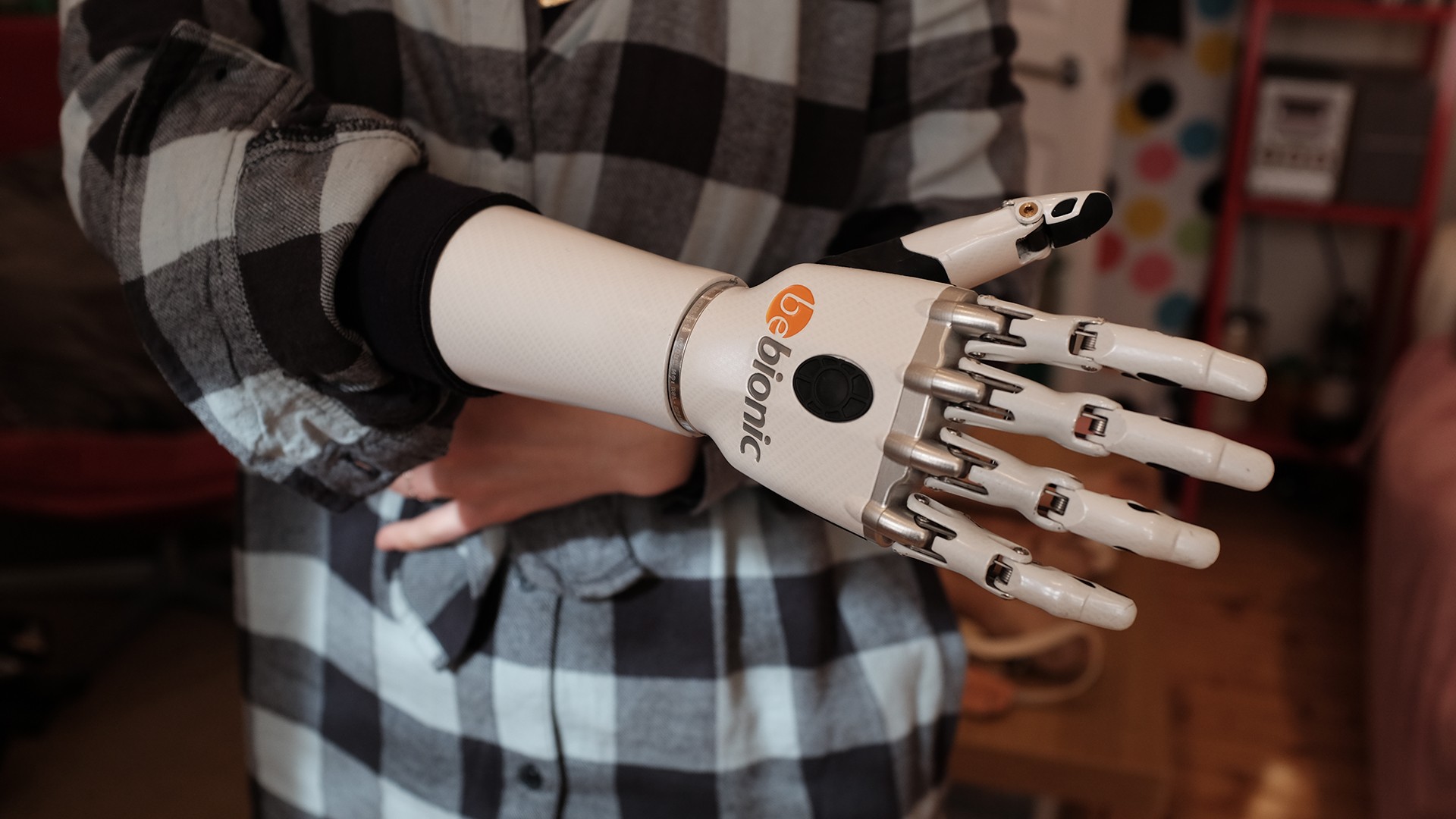Despite what you see in the movies, most amputees aren't war veterans who lost a leg in a grizzly battle. Eighty-two percent of amputations are due to peripheral vascular disease or diabetes. The word "amputee" doesn't necessarily mean you've had a limb amputated, either; it also applies to people born with a limb missing.Tom Rourke, a 29-year-old animator from Nottingham, has been an amputee as long as he can remember. Aside from people mistaking you for a former-soldier, what is it actually like to live a regular old life, going to work and on Tinder dates, with a prosthetic leg?VICE: When did you lose your leg?
Tom Rourke: I was born with my right leg malformed. I didn’t have both the bones beneath the knee. I wouldn’t have been able to walk on it if they’d just left it like that, I’d have been in a wheelchair. When I was three or four they decided to amputate it. They took my foot off so I could use a prosthetic.So is the amputation under the knee?
Yeah, just above where the ankle would be.Do you remember having your leg?
No. I vaguely remember being in hospital when they amputated it, but all I remember was being in the ward – I have no memory of the leg. I have a couple of other memories from around then; I have memories about a dog.How much does it affect your day-to-day life?
There’s a daily element to it, but you work your way around it. Stuff like showering in the morning, you have to be really careful. If you imagine getting into a shower with one leg, you could fall over and break your neck easily. If I’m moving somewhere I’ll look for somewhere with a shower over the bath because they’re easier to climb into than the cubicle showers. There is no easy way to leverage yourself over those tiny metal steps.
WATCH:
Can you do sports?
I can do most things. I don’t think I could do rock climbing because my leg would just fall off. Anything using an ankle is tricky – when I was a kid, I used to try and skateboard, but you need an ankle to do an ollie. Although, for a while, if you lost a leg in the east Midlands, where I grew up, they'd show you a video of me rollerblading to show what was possible.How often do you get a new prosthetic?
I’ve had this one for six or seven years because it’s quite hardy, other than the foot needing to be replaced now and then. The foot’s a separate rubber bit on the end that you can remove. I’ve got an appointment in a few weeks – I’ll think they’ll tell me that I need a new leg.Where do you go when you need a new leg?
I go to a clinic for people who’ve lost arms or legs. I used to go to one that was an entire building just for that: for people with amputations from birth, or who’d had them later due to accidents or whatever. There were rooms with shelves from floor to ceiling with just arms or legs on them. They also did glass eyes; there was a cabinet full of glass eyes. It was very weird.Are prosthetics like NHS specs, where there’s one standard one?
Yeah, I’ve got the bog standard one, because it can really take a battering and I’m not that worried about how it looks. I went to Norway and climbed a mountain and it just takes anything. There are other models, but they break a lot easier because they have more components in them to break. You have specialist ones for certain activities, like skiing. Women sometimes get specialist ones so they can wear heels.In a dating situation, when do you tell someone?
I usually try and say fairly early on, because you don’t want it to be a surprise. I think that’s fair to them.Does everyone in your life know?
I forget to tell people sometimes. A friend of mine didn’t realise for about six months after knowing me. I just sort of forgot to tell her because it’s not something I think of all the time.Do you think it’s had an influence on who you are?
It probably meant that I was inside more when I was a little kid, particularly around the time it was amputated, doing a lot of drawing, so it had to have some influence.Do you think there are any benefits to it?
It makes you a bit more sensitive to other people’s things, I think. And it drives you. Because it’s something that should stop you, you go in the opposite direction.@wernerspenguin
Advertisement
Tom Rourke: I was born with my right leg malformed. I didn’t have both the bones beneath the knee. I wouldn’t have been able to walk on it if they’d just left it like that, I’d have been in a wheelchair. When I was three or four they decided to amputate it. They took my foot off so I could use a prosthetic.So is the amputation under the knee?
Yeah, just above where the ankle would be.Do you remember having your leg?
No. I vaguely remember being in hospital when they amputated it, but all I remember was being in the ward – I have no memory of the leg. I have a couple of other memories from around then; I have memories about a dog.How much does it affect your day-to-day life?
There’s a daily element to it, but you work your way around it. Stuff like showering in the morning, you have to be really careful. If you imagine getting into a shower with one leg, you could fall over and break your neck easily. If I’m moving somewhere I’ll look for somewhere with a shower over the bath because they’re easier to climb into than the cubicle showers. There is no easy way to leverage yourself over those tiny metal steps.
WATCH:

Can you do sports?
I can do most things. I don’t think I could do rock climbing because my leg would just fall off. Anything using an ankle is tricky – when I was a kid, I used to try and skateboard, but you need an ankle to do an ollie. Although, for a while, if you lost a leg in the east Midlands, where I grew up, they'd show you a video of me rollerblading to show what was possible.
Advertisement
I’ve had this one for six or seven years because it’s quite hardy, other than the foot needing to be replaced now and then. The foot’s a separate rubber bit on the end that you can remove. I’ve got an appointment in a few weeks – I’ll think they’ll tell me that I need a new leg.Where do you go when you need a new leg?
I go to a clinic for people who’ve lost arms or legs. I used to go to one that was an entire building just for that: for people with amputations from birth, or who’d had them later due to accidents or whatever. There were rooms with shelves from floor to ceiling with just arms or legs on them. They also did glass eyes; there was a cabinet full of glass eyes. It was very weird.Are prosthetics like NHS specs, where there’s one standard one?
Yeah, I’ve got the bog standard one, because it can really take a battering and I’m not that worried about how it looks. I went to Norway and climbed a mountain and it just takes anything. There are other models, but they break a lot easier because they have more components in them to break. You have specialist ones for certain activities, like skiing. Women sometimes get specialist ones so they can wear heels.In a dating situation, when do you tell someone?
I usually try and say fairly early on, because you don’t want it to be a surprise. I think that’s fair to them.Does everyone in your life know?
I forget to tell people sometimes. A friend of mine didn’t realise for about six months after knowing me. I just sort of forgot to tell her because it’s not something I think of all the time.Do you think it’s had an influence on who you are?
It probably meant that I was inside more when I was a little kid, particularly around the time it was amputated, doing a lot of drawing, so it had to have some influence.Do you think there are any benefits to it?
It makes you a bit more sensitive to other people’s things, I think. And it drives you. Because it’s something that should stop you, you go in the opposite direction.@wernerspenguin
